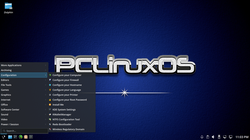Review: Debian GNU/Hurd 2023 and PCLinuxOS 2023.07 "KDE"
While many rolling release distributions constantly chase after the latest technologies, themes, and cutting edge packages, PCLinuxOS is unusual in that it has a strongly conservative approach. The distribution does provide up to date packages, but it feels like a lot of effort has been put into keeping the distribution stable and running smoothly via older approaches. PCLinuxOS doesn't move with the latest trends. This is a project which doesn't enable a lot of visual effects, doesn't leap on newer technologies, doesn't attempt to package every new desktop that comes along. It's still running SysV init (instead of systemd), it's still using an X11 session for Plasma instead of Wayland, it still offers MATE over GNOME, and it is still using the Synaptic package manager over more modern software centres like Discover.
In short, despite the regular flow of updated packages flowing into the distribution's repositories, not much seems to be changing with PCLinuxOS. It's reluctant to adopt new ways of doing things, like portable packages and welcome windows, and advanced filesystems. Most of the tools, approaches, and system administration modules still look and behave the same way they did ten years ago.
This might appeal to a lot of users, particularly ones who were getting started with Linux around the time PCLinuxOS reached the top of the DistroWatch page hit ranking charts, nearly 20 years ago. People who have been comfortable with Linux for a long time and don't feel the urge to roll with the times will probably enjoy this distribution a lot. There is a strong sense when using PCLinuxOS that if something isn't broke, then they don't fix it.
However, on the other side of that coin, there are some tools and approaches which have become so commonplace these days that it feels odd to not see them included in this distribution. It feels odd to be missing so many manual pages (though not all of them), it feels a bit strange to be manually adding and troubleshooting Flatpak at this point, it feels a bit alien to not have access to sudo (or doas) on a modern Linux distribution. PCLinuxOS is unusually static for a rolling release, to the point I was able to copy/paste some of the paragraphs in this review from a previous article I wrote about the distribution over four years ago.
Basically, for the past decade, PCLinuxOS has been upgrading its packages to keep up with upstream, but it doesn't appear to have tried anything new or introduced any custom tools. This probably appeals to existing PCLinuxOS users as they can continue to feel comfortable, but it is a project unlikely to draw new users who expect to have access to certain modern tools or resources.

